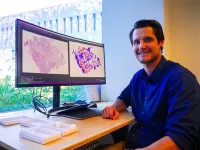(Press-News.org) A new generation of artificial intelligence (AI) tools designed to allow rapid, low-cost detection of clinically actionable genomic alterations directly from tumor biopsy slides has been developed by a team led by engineers and medical researchers at University of California San Diego.
A paper describing the new AI protocol for examining routine biopsies, called DeepHRD, was recently published in the Journal of Clinical Oncology.
Senior author Ludmil Alexandrov, Ph.D., professor of bioengineering and professor of cellular and molecular medicine at UC San Diego, says the new method is designed to save weeks and thousands of dollars from clinical oncology treatment workflows for breast and ovarian cancers.
The team says their work represents an enormous step forward in the global efforts to eliminate the delays and health inequalities that have confounded the promise of precision medicine for cancer patients. Big picture: To develop new AI tools that can complement or replace the expensive and time-consuming genomic testing required to determine the best first-line cancer treatment specific for each individual patient.
“A cancer patient today can expect to wait crucial weeks after their initial tumor diagnosis for a standard genomic test, resulting in life-threatening delays in treatment,” said Alexandrov. “It is very concerning that high costs and time delays render lifesaving treatment protocols inaccessible for most patients, disproportionately impacting resource-constrained settings.”
At UC San Diego, this work represents a collaboration spanning all across campus, including the Department of Cellular and Molecular Medicine in the UC San Diego School of Medicine, the Shu Chien-Gene Lay Department of Bioengineering at the UC San Diego Jacobs School of Engineering, Institute of Engineering in Medicine, Department of Medicine, and the UC San Diego Moores Cancer Center.
It was the potential of precision oncology to tailor an individual patient’s treatment options that motivated the collaborators, said Erik Bergstrom, Ph.D., lead author of the study and a postdoctoral researcher in Alexandrov’s lab, which bridges bioengineering and medicine.
“Unfortunately, high costs, tissue requirements and slow turnaround times have hindered the widespread use of precision oncology, leading to suboptimal — potentially detrimental — treatment for cancer patients,” Bergstrom said. “We wanted to see if we could develop a completely different approach to resolve this serious issue by designing AI to circumvent the need for genomic testing.”
Bergstrom said the collaborators focused on leveraging the minimum amount of patient information that is available early in the diagnostic process. He explained that virtually every cancer patient undergoes a tumor biopsy, a tissue sample that is routinely processed and examined through a light microscope. The process was developed in the late 19th century and is still the standard backbone of early clinical oncology workflows today.
“Our AI, applied directly to a traditional tissue slide, allows accurate, instantaneous detection of cancer genomic biomarkers,” Bergstrom said. He explained that the team focused on AI identification of a specific biomarker for homologous recombination deficiency (HRD), a condition in which a cancerous cell loses a specific DNA damage repair mechanism.
Bergstrom pointed out that patients with ovarian or breast cancers harboring HRD generally respond well to platinum and PARP (poly-ADP ribose polymerase) therapies, two common forms of chemotherapy.
“This AI approach saves the patient critical time,” Alexandrov added. “Oncologists can prescribe treatment immediately after initial tissue diagnosis. Remarkably, the AI test has a negligible failure rate, while current genomic tests have a failure rate of 20 to 30 percent, necessitating re-testing, or even invasive re-biopsy.”
The study’s co-senior author Scott Lippman, M.D., UC San Diego distinguished professor of medicine, Center for Engineering and Cancer, and Moores Cancer Center member, said the new technology will remove barriers of time and money to allow immediate, universal access and equality to actionable genomic biomarker detection — required for precision therapy — for people with advanced cancers. The extraordinary aspect of this breakthrough AI, is that it will benefit highly-informed, -resourced populations, and remarkably, will close the severe disparities ‘gap’ in precision medicine, especially in resource-constrained, remote regions worldwide where testing is not yet extant.
“The era of precision oncology took off in the late 90s, but recent U.S. studies show that the vast majority of cancer patients are not getting FDA-approved precision therapy,” Lippman said. “And the prime reason is because they're not getting tested. As a clinical oncologist — and I've been doing this for nearly 40 years — there is no question that this approach is the future of precision oncology.”
The AI technology behind DeepHRD is protected by provisional patents through UC San Diego, which have been licensed to io9, a company with strong involvement by Alexandrov, Bergstrom and Lippman, and the goal to move this AI platform into the clinical arena as quickly as possible to make precision therapy real for patients with cancer by getting them onto the precise treatments they need faster. The authors expect that the same technology could be applied to most other genomic biomarkers and many forms of cancer.
Affiliations: The authors have the affiliations noted above: Ludmil B. Alexandrov has appointments at UC San Diego Moores Cancer Center, School of Medicine Department of Cellular and Molecular Medicine, Sanford Stem Cell Institute and the Department of Bioengineering at the Irwin & Joan Jacobs School of Engineering. Erik N. Bergstrom is affiliated with Moores Cancer Center and Department of Cellular and Molecular Medicine. Scott M. Lippman has appointments at Moores Cancer Center, Department of Medicine; and is a Member & Board of Advisors and Co-director of the Center for Engineering and Cancer, Institute of Engineering in Medicine. Other co-authors are Ammal Abbasi and Marcos Díaz-Gay, both of Moores Cancer Center and Department of Cellular and Molecular Medicine and the Jacobs School of Engineering Department of Bioengineering; Loïck Galland and Sylvain Ladoire, both of the Department of Medical Oncology and the Platform of Transfer in Biological Oncology Centre, Georges-François Leclerc Cancer Center and University of Burgundy-Franche, France.
Funding: This work was funded by U.S. National Institutes of Health grants R01ES032547 and U01DE033345 to Ludmil B. Alexandrov, and P30 CA023100 to Scott M. Lippman, as well as by a Curebound Targeted grant and UC San Diego start-up funding to Alexandrov. The research in this study was also supported by UC San Diego Sanford Stem Cell Institute.
# # #
END
Precision oncology via artificial intelligence on cancer biopsies
A new AI protocol bypasses genomic sequencing and promises access and equity in cancer care
2024-07-31
ELSE PRESS RELEASES FROM THIS DATE:
What you don't know about endometrial cancer could kill you
2024-07-31
CLEVELAND, Ohio (July 31, 2024)—Despite the fact that endometrial cancer is the most common cancer of the female reproductive organs, a significant percentage of women do not know that postmenopausal bleeding is a key warning sign of the disease. Worse, even fewer women report having received any type of counseling on the subject from their healthcare professionals. That’s according to a new study published online today in Menopause, the journal of The Menopause Society.
It is estimated that 67,880 new cases of ...
Does it matter that the ovaries are the most rapidly aging organs in the female body?
2024-07-31
CLEVELAND, Ohio (August 1, 2024)—Because of the aging of the ovaries, a woman’s fertility gradually declines, and she eventually enters menopause. The onset of menopause puts women at a significantly higher risk of various diseases such as cardiovascular disease and osteoporosis. A new study suggests that a shorter reproductive lifespan is linked with a higher risk of multimorbidity. Results of the survey are published online today in Menopause, the journal of The Menopause Society.
The effect of reproductive-related factors on women’s health has become a focus of interest and study in recent years. Previous studies have identified the ...
Serotonin uptake regulates ependymoma tumor growth
2024-07-31
(MEMPHIS, Tenn. – July 31, 2024) Do neurons play a role in brain tumor growth and development? Scientists at St. Jude Children’s Research Hospital and Baylor College of Medicine have evidence showing that, for childhood ependymomas, they do. There are no targeted therapies available to treat ependymoma due in large part to a lack of understanding of the tumor microenvironment. By leveraging a recently developed murine model, scientists explored the interaction between ependymoma cells and surrounding neurons. They found that hyperactivation of a specific subset ...
Scientists set sail to study Greenland glaciers from underwater
2024-07-31
The University of Texas at Austin has embarked on a mission to explore the underwater edges of Greenland’s coastal glaciers to learn more about future sea level rise.
The four-week expedition conducted with international partners will investigate processes that control how these giant glaciers melt and what that means for the future of the Greenland ice sheet, which has about 23 feet (7 meters) of potential sea level rise locked away in its ice.
Joining the researchers is a robotic submersible that will gather measurements of the glaciers’ underwater walls and sediment-laden meltwater, a feat that’s never been ...
Smell reports reveal the need to expand urban air quality monitoring, say UBC researchers
2024-07-31
Ever wondered if your neighbourhood odour could be impacting your health? University of British Columbia researchers have uncovered surprising insights into the Vancouver region's “smellscape” using data from the Smell Vancouver app. Analyzing 549 reports from one year of app data, they discovered that “rotten” and “chemical” odours dominated, making up about 65 per cent of submissions. These unpleasant smells were linked to self-reported health issues like headaches and anxiety, leading some residents to change their behaviours, like closing windows even in stifling-hot weather.
“The ...
Type 1 diabetes: UAB startup gains FDA clearance to test novel oral drug
2024-07-31
BIRMINGHAM, Ala. – The University of Alabama at Birmingham startup TIXiMED, Inc., has obtained clearance from the United States Food and Drug Administration to proceed to clinical trials under an Investigational New Drug for TIX100, its novel oral Type 1 diabetes drug. This represents a major milestone in the development of this new approach to T1D treatment and gives TIXiMED the green light to start human studies with TIX100.
The development of TIX100 is based on decades of research by Anath Shalev, M.D., the Nancy R. and Eugene C. Gwaltney Family Endowed Chair in Juvenile Diabetes Research in the UAB Division ...
Can this device prevent a stroke during a heart valve operation? New research shows potential benefit
2024-07-31
Recently published research shows a medical device may be beneficial for patients who have previously had a stroke and are planning to undergo a transcatheter aortic valve replacement, a type of heart valve operation.
Neel Butala, MD, an assistant professor in the Division of Cardiology at the University of Colorado Department of Medicine, is the first author of the article, which was presented as a late-breaking clinical trial at the New York Valves 2024 conference and simultaneously published in Circulation: Cardiovascular Interventions, an American Heart Association journal.
The ...
Method prevents an AI model from being overconfident about wrong answers
2024-07-31
CAMBRIDGE, MA — People use large language models for a huge array of tasks, from translating an article to identifying financial fraud. However, despite the incredible capabilities and versatility of these models, they sometimes generate inaccurate responses.
On top of that problem, the models can be overconfident about wrong answers or underconfident about correct ones, making it tough for a user to know when a model can be trusted.
Researchers typically calibrate a machine-learning model to ensure its level of confidence lines up with ...
Are cardiovascular risk factors linked to migraine?
2024-07-31
MINNEAPOLIS – Having high blood pressure, specifically high diastolic blood pressure, was linked to a slightly higher odds of ever having migraine in female participants, according to a new study published in the July 31, 2024, online issue of Neurology®, the medical journal of the American Academy of Neurology. Diastolic pressure is when the heart is resting between beats. However, the study did not find an increased risk between other cardiovascular risk factors and migraine.
“Previous research shows that migraine is linked to a higher ...
Cleveland Clinic-led research identifies priority zones that may help improve colorectal cancer screening among Hispanic/Latino individuals
2024-07-31
July 31, 2024, CLEVELAND – Cleveland Clinic-led research has identified geographic areas in the United States where strategic efforts to promote colorectal cancer screening could help reduce healthcare gaps affecting Hispanic/Latino communities.
The study, published in the American Journal of Public Health, marks a first step toward conducting larger neighborhood-level studies addressing disparities in colorectal cancer screening.
The Hispanic /Latino population has the lowest colorectal cancer screening rate among U.S. racial and ethnic groups as defined by ...
LAST 30 PRESS RELEASES:
Weill Cornell Medicine selected for Prostate Cancer Foundation Challenge Award
Largest high-precision 3D facial database built in China, enabling more lifelike digital humans
SwRI upgrades facilities to expand subsurface safety valve testing to new application
Iron deficiency blocks the growth of young pancreatic cells
Selective forest thinning in the eastern Cascades supports both snowpack and wildfire resilience
A sea of light: HETDEX astronomers reveal hidden structures in the young universe
Some young gamers may be at higher risk of mental health problems, but family and school support can help
Reduce rust by dumping your wok twice, and other kitchen tips
High-fat diet accelerates breast cancer tumor growth and invasion
Leveraging AI models, neuroscientists parse canary songs to better understand human speech
Ultraprocessed food consumption and behavioral outcomes in Canadian children
The ISSCR honors Dr. Kyle M. Loh with the 2026 Early Career Impact Award for Transformative Advances in Stem Cell Biology
The ISSCR honors Alexander Meissner with the 2026 ISSCR Momentum Award for exceptional work in developmental and stem cell epigenetics
The ISSCR honors stem cell COREdinates and CorEUstem with the 2026 ISSCR Public Service Award
Minimally invasive procedure effectively treats small kidney cancers
SwRI earns CMMC Level 2 cybersecurity certification
Doctors and nurses believe their own substance use affects patients
Life forms can planet hop on asteroid debris – and survive
Sylvia Hurtado voted AERA President-Elect; key members elected to AERA Council
Mount Sinai and King Saud University Medical City forge a three-year collaboration to advance precision medicine in familial inflammatory bowel disease
AI biases can influence people’s perception of history
Prenatal opioid exposure and well-being through adolescence
Big and small dogs both impact indoor air quality, just differently
Wearing a weighted vest to strengthen bones? Make sure you’re moving
Microbe survives the pressures of impact-induced ejection from Mars
Asteroid samples offer new insights into conditions when the solar system formed
Fecal transplants from older mice significantly improve ovarian function and fertility in younger mice
Delight for diastereomer production: A novel strategy for organic chemistry
Permafrost is key to carbon storage. That makes northern wildfires even more dangerous
Hairdressers could be a secret weapon in tackling climate change, new research finds
[Press-News.org] Precision oncology via artificial intelligence on cancer biopsiesA new AI protocol bypasses genomic sequencing and promises access and equity in cancer care





